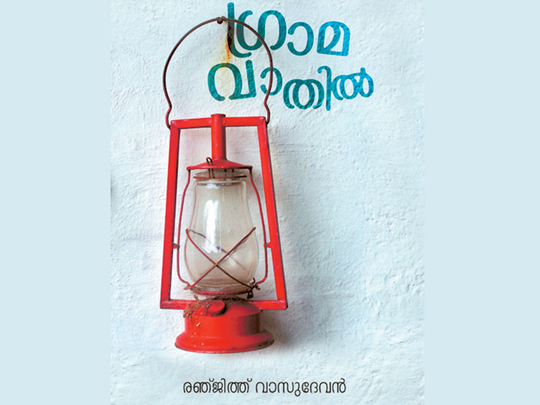
Grama Vaathil
By Rengith Vasudevan, Writers Library (An Imprint of Olive Publications, Kozhikode), 129 pages, Rs110
To write a novel is in itself a struggle many would give up half way. Once having completed the manuscript against all odds, getting it published is another mighty hurdle which most wannabe authors struggle to overcome.
Rengith Vasudevan, who works in the editorial department of Gulf News in Dubai, has dedicated his first novel — “Grama Vaathil” [At the Village Gate] — to his late father — a nostalgic trip for the writer who has spent most of his working life here in the Gulf — underlining the bond from one generation to the other and also illustrating the pull of one’s own homeland, however far we go.
The author has used a representative of the older generation, retired army officer Major Vishwanathan, as a role model of a good citizen, who comes back to the familiarity of his home village, and plunges headlong into grassroots governance and succeeds beyond all measure in changing the political and administrative landscape.
What Mahatma Gandhiji envisaged for India was the concept of self-government at the village level, not the top down developmental model that is prevalent now. Self-governing village bodies existed in India for ages and the concept was revived during the freedom movement. As the third tier of government, panachayats (village councils) in India can play a crucial role in improving the quality of life of the poorest of poor.
In “Grama Vaathil”, the author draws on this idealistic blueprint for social welfare and all-round development. You could say that it is in sync with the dominant public mood back home and those disenchanted with mainstream political parties looking for alternatives such as the Aam Aadmi Party in Delhi.
The narrative is from the author’s point of view. Hence, very rarely do you get into the mind of the characters. In spite of this, there are some characters who stand out — the elderly relative Ramettan, the coconut plucker Velayudhan, senior army officer Brigadier Chandra Shekharan, and finally the protagonist’s love interest in college Revathy.
Having an interesting beginning and satisfactory ending, the author needed to work harder on the middle portion, which reads more like the minutes of a general body meeting at times.
The author has consciously used short sentences, shorn of any literary flourish. I am sure the author and publisher will go for a second edition which will also give the opportunity to take in readers’ as well as critical feedback, so that the novel provides a richer and more memorable read.
Having launched himself into the select category of a published author under a leading publisher, Rengith Vasudevan should think of continuing on this writerly path and come out with bold themes with a native touch.
Although expatriates play only a peripheral role in this novel, in the future the author can profitably make good use of his experience of expat life in the Gulf to make it central to his literary work.
Malayalam literature has been made richer by expatriate writers and the author of “Grama Vaathil” should follow in their footsteps by breaking new ground in theme and style.
N.P. Krishna Kumar is a freelance writer based in Dubai








